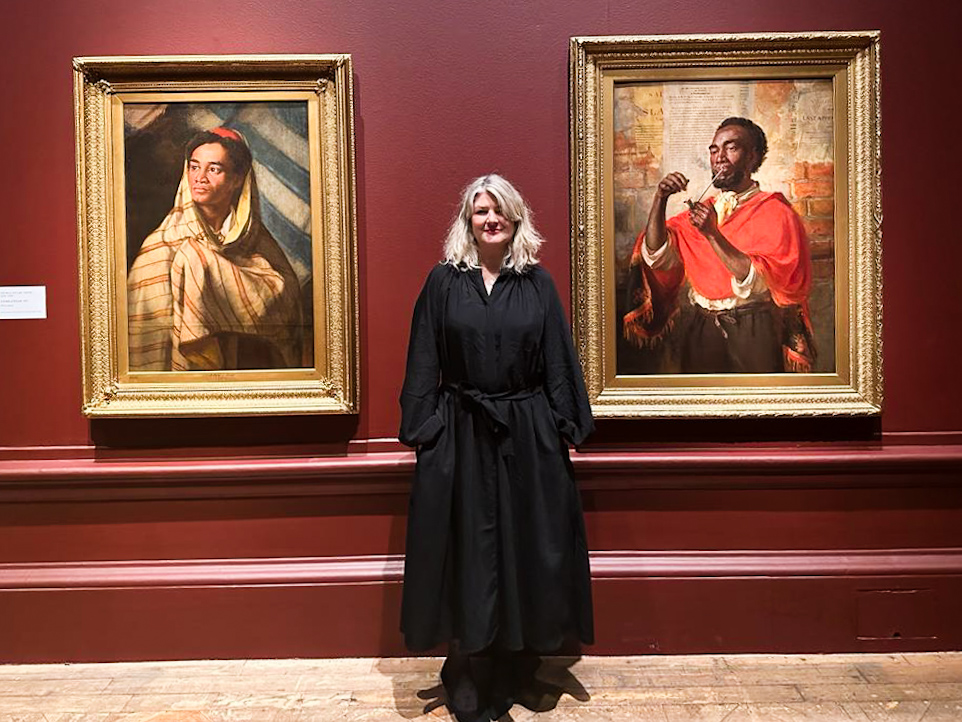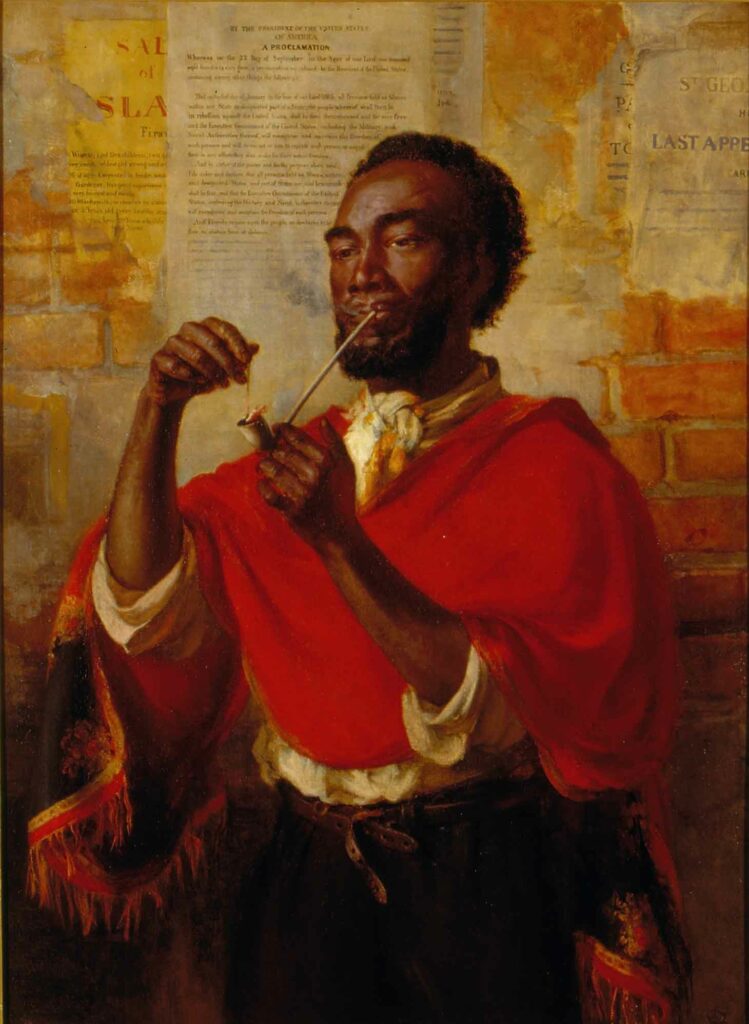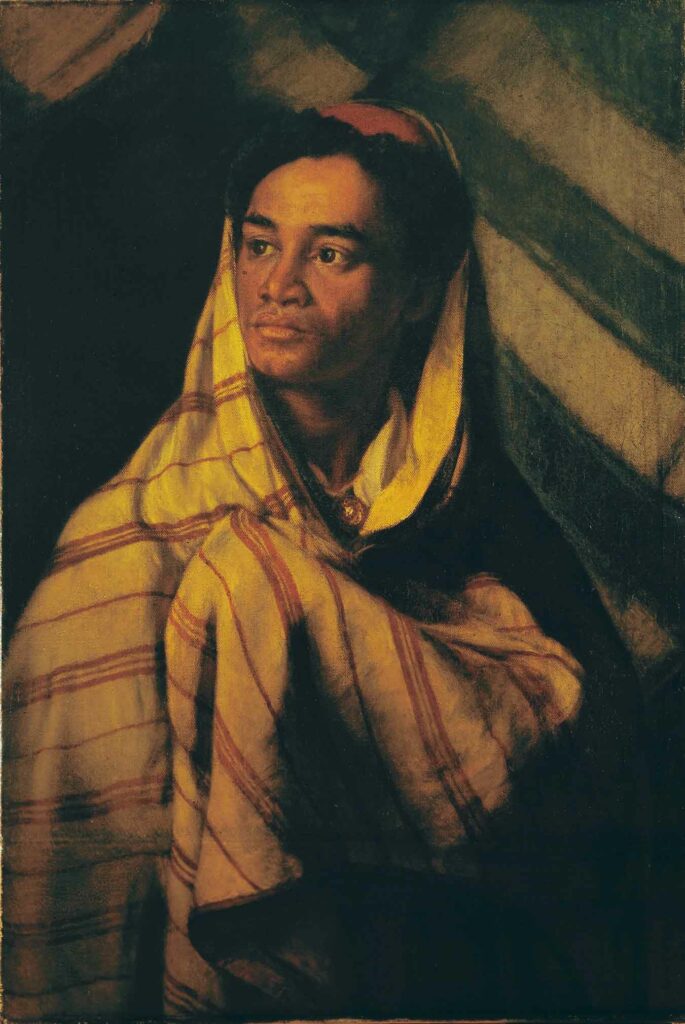
Caroline Mathers, Director of The Stirling Smith Art Gallery and Museum, with Thomas Stuart Smith’s paintings at the Royal Academy exhibition.
The Stirling Smith is delighted to have two major works by founder Thomas Stuart Smith, represented at the Royal Academy exhibition ‘Entangled Pasts, 1768 – now: Art, Colonialism and Change’.
Thomas Stuart Smith was a Scottish artist, abolitionist, visionary who regularly submitted his own paintings to Royal Academy exhibitions from 1865. ‘The Pipe of Freedom’, now considered his best painting, was rejected by the 1869 committee on political grounds.
The Stirling Smith’s Director, Caroline Mathers said:
“Smith’s paintings sit amongst artworks by leading contemporary British artists of the African, Caribbean and South Asian diasporas, and historic work from the past 250 years, creating connections across time which explore questions of power, representation and history. Given ‘The Pipe of Freedom’ was rejected by the Royal Academy in 1869 on political grounds, while ‘A Fellah of Kinneh’ was accepted, it’s fitting to see the works displayed together at The Royal Academy 155 years later. These particular works are testament to Smith’s commitment to social justice.”

‘The Pipe of Freedom’ by Thomas Stuart Smith (1869), oil on canvas
At the first glance The Pipe of Freedom shines with the warmth of the colours and the relaxed stance of the man in the foreground. His red paisley shawl wraps him in a contentment reflected in the half smile on his lips as he lights the long-stemmed clay pipe. But even the choice of the subject was unusual – at this time black people were more often painted as servants. A closer look at the background also hints that this picture is more than just a simple portrait – it is a political statement too.
The brick wall behind the man is covered with posters, including a yellow one publicising the sale of slaves. This has been covered by a copy of Abraham Lincoln’s Emancipation Proclamation, which declared in 1863 “that all persons held as slaves” within the rebellious states “are, and henceforward shall be free.”

‘A Fellah of Kinneh’ by Thomas Stuart Smith (1869), oil on canvas
‘A Fellah from Kinneh’ was submitted to the Royal Academy Exhibition in 1869 and was accepted, but not displayed prominently. Like ‘The Pipe of Freedom’, this painting is unusual not just because of its life-size scale, but because of its subject matter. It was most likely painted in London using a model from North Africa. Fellah is an old word for an Egyptian farmer or farm worker; Kinneh an old spelling of the town of Qena, on the eastern bank of the River Nile in Egypt. By choosing a black man as the central figure, Stuart Smith is asserting his belief that all men are free.
Despite the initial rejection of ‘The Pipe of Freedom’ and lacklustre reception of ‘A Fellah of Kinneh’, the works have sparked interest in more recent years, featuring in several exhibitions exploring black history. Notably, in 2020 British opera singer Peter Braithwaite recreated the ‘The Pipe of Freedom’ as part of his ‘Rediscovering Black Portraiture’ project. In response to the Getty Museum’s social media challenge that prompted the recreation of artworks using household items, he embarked on an extraordinary project. His aim was to meticulously recreate numerous artworks depicting black individuals and share the impressive results on social media, showcasing the project under the designated hashtag #BlackPortraiture.
‘Entangled Pasts, 1768 – now: Art, Colonialism and Change’ brings together over 100 major contemporary and historic works as part of a conversation about art and its role in shaping narratives of empire, enslavement, resistance, abolition and colonialism – and how it may help set a course for the future.
The exhibition runs at the Royal Academy until Sunday 28 April 2024.

Comment(1)
Ilmu Komunikasi says
22nd September 2024 at 4:00 AMat this time black people were more often painted as servants? Regard Ilmu Komunikasi